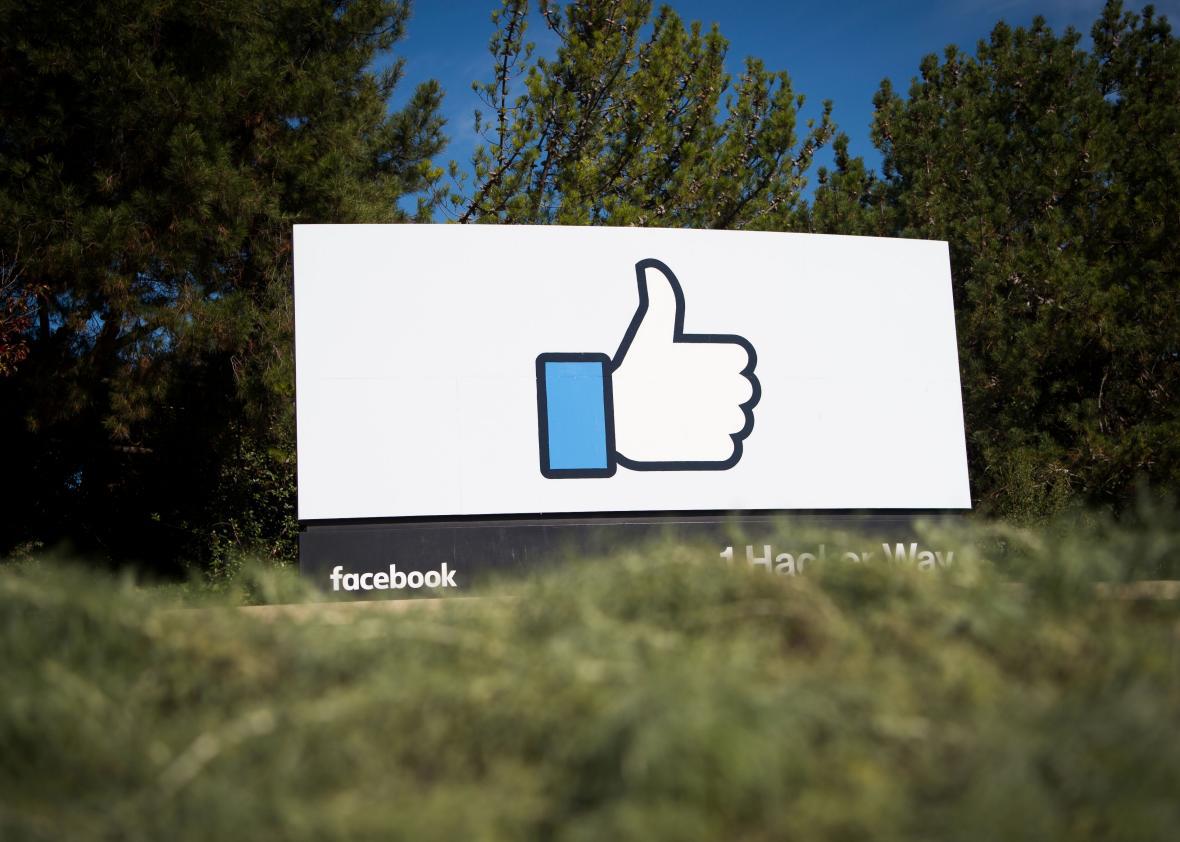Like a handful of major tech companies, Facebook has spent much of the past week removing content from white supremacists and neo-Nazis following the Unite the Right rally in Charlottesville, Virginia. Its targets included the rally’s main event page, as well as other related hate-group pages, including White Nationalists United, Right Wing Death Squad, Genuine Donald Trump, and others. Removing those pages was the right move, especially if the groups were using Facebook to promote violence.
But neo-Nazi pages weren’t the only thing Facebook banned last weekend. On Sunday, the Facebook page of a conservative, Los Angeles-based street artist named Sabo was taken down for using hate speech, too, according to a tweet from the artist following the removal of his page. But in this case, the timing of his Facebook suspension is curious.
The week before Sabo lost his Facebook privileges, the artist hung posters in a number of California cities that read “Fuck Zuck 2020,” pictures of which he posted on his Facebook page. The posters were an obvious play on persistent speculation that Facebook CEO Mark Zuckerberg has political ambitions following his recent Harvard commencement speech and 2017 tour across the U.S., during which the young executive has been trying to understand people who live in parts of the country he’s less familiar with. Zuckerberg even hired a former Clinton pollster earlier this month to advise his philanthropic work.
Sabo, to be clear, is known for making incredibly offensive art, often intentionally using racist and sexist imagery that is hateful, hurtful, and at times in clear violation of Facebook’s community policies. But the “Fuck Zuck” posters don’t necessarily fit that bill, even if they were likely offensive to the company’s CEO.
Sabo says that the note he received from Facebook said, “While we allow individuals to speak freely on Facebook, we take action on verbal abuse directed at individuals,” but the company didn’t include a direct reference to the offending post or posts in question.
Though Sabo been booted from Facebook in the past for other reasons, if this time the censorship was sparked by his most recent anti-Zuckerberg posters, then Facebook has some explaining to do. After all, the website has let blatantly anti-Semitic websites be classified as news, like the Daily Stormer, which was the platform used by neo-Nazis to organize the rally that ended in violence this weekend in Charlottesville. Facebook’s algorithm maybe even gave a massive boost to a Daily Stormer article mocking Heather Heyer, the counterprotester who was killed by a rally attendee who drove his car into a crowd Saturday afternoon. Now Facebook is deleting links to the Daily Stormer’s article, but only after the post was already shared at least 65,000 times.
Last Friday, Sabo also hung posters around Google and YouTube offices in Los Angeles in protest of Google’s firing of the software engineer James Damore, who wrote the viral memo that claimed gender disparities in technical and leadership roles at the company are due to biological differences between men and women. The Google-specific posters featured a photo of Apple CEO Tim Cook with the caption “Think Different” next to a photo of Google CEO Sundar Pichai that read, “Not So Much.”
While both the Zuck 2020 posters and the anti-Google posters are without a doubt offensive to some, neither really constitutes hate speech. The posters don’t appear make anyone unsafe, nor do they denounce or attack a group based on their ethnicity, race, religious affiliation, gender, or any of the other reasons Facebook lists in its community standards page on hate speech.
Again, Sabo has certainly made racist and horribly offensive art before, like posters mocking the Black Lives Matter movement that looked like movie ads for Planet of the Apes. Yet when those posters went up around the end of July and photos were posted on Facebook, Sabo says his page was not removed at that time.
One main problem here is that Facebook isn’t clarifying what the offensive content in question was. (The company also didn’t respond to a request for comment.) Rather, Facebook appears to be arguing that it acts on “verbal abuse directed at individuals,” which sure feels like a reaction to the “Fuck Zuck” posters.
Facebook hasn’t always been the most consistent when policing hate speech on its platform, nor is it clear what exactly does and does not count as speech that might get a user banned, which has led to uneven censorship. In June, ProPublica released a report on Facebook’s content moderation strategies that detailed internal documents describing how white men are a category of users who get special protection from hate speech, but black children are not. These distorted polices were never made public by Facebook, and users often don’t know when they’re saying something that could get them suspended. If the social media company were more transparent about how it classifies hate speech, not only would users be more aware of the rules of the road, but public scrutiny would likely prevent it from holding such lopsided polices in the first place. All of which is illustrative of why being crystal-clear about how the social media giant policies content is just as important as being proactive about banning hate speech and protecting user safety in the first place.
